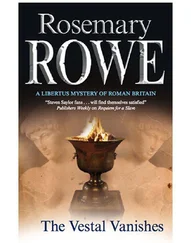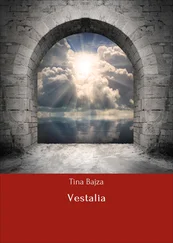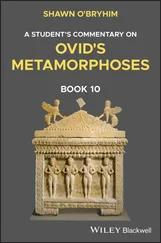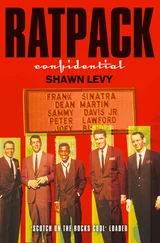Ruth stuffs two more ears into the bag. “Okay, run these down,” she says, and Alma and Sarah shuffle away down the row.
She steps through cornstalks into a new row and stumbles into someone, and she apologizes, and a man answers in a deep voice and turns to face her. A new person. An unfamiliar person. He is tall and he is young — a young man, the rarest of people around here — and he is handsome, despite a pair of large, flappy ears. Ruth feels as if she has been pleasantly tricked. She would like to stare at him. Study him. The back of her neck flushes.
“Hello, young lady,” he says, arms full of corn, bowing in a manner that might be mischievous, and she says, “Hello, old man.” Ruth steps back through the cornstalks to the row she had come from, and she can hear him chuckling. She stands there, catching her breath as if recovering from a fright, until her sisters come running down the row, laughing.
• • •
Walking home, Ruth’s sisters needle her about Brother Billy. They’re supposed to call him Brother Adler, but he is too familiar from the days when he was younger and would sometimes watch them while they played with his younger sisters. Ruth cannot think of him by any other name.
“You’ll need to watch out for his elbows,” Sarah says quietly, and Alma giggles, and adds, “He’ll give you a black eye.” Ruth hisses, “You shut your mouth,” and Sarah gasps in mock astonishment, and Alma says, “I’m telling,” and Ruth says, “You go right ahead,” and the girls giggle harder.
His dancing is but one of the many ways in which Ruth finds Brother Billy unacceptable. The main one she cannot express, or feels she is not supposed to express: he simply does not attract her. He does not draw her, does not please her senses, does not appeal. She does not want to dance with him. She is a precise and excellent dancer, Ruth is, and Brother Billy’s laughing, loose way of dancing is embarrassing — bumping into the others, mixing up his feet, coming in late on calls. And she does not want to do any of the other things a girl might want to do in courtship. She does not want to hold his hand, and she does not — definitely, absolutely — want to do the many unthinkable things she has been thinking about doing. Not with him.
Every time her father speaks to her these days, she dreads the possibility that he will tell her Brother Billy has asked to begin courtship. She tries to imagine her father allowing her to say no. Ruth had been the last to see it, and the sting of feeling foolish is still fresh. Brother Billy came to Sunday dinner three times in May and June, each time without his young wife and their two children. Ruth’s mother had paid extra attention to her dress and her hair those days, and her father had been unusually generous and kind to her in front of Brother Billy, thanking her warmly, calling her sweetheart, smiling lovingly, a charade that was obvious to everyone but Ruth, somehow. After dinner in the kitchen it was Sarah, young Sarah, just eleven years old, who said, “Looks like someone’s courting,” and giggled with the others while Ruth’s face burned. How had she not seen this? Everything about it was obvious, and still, she had not. Ruth is sixteen. Three of the girls she grew up with have married already, two of them as sister wives. The world around her works in just this way — the sideways courtship, the arrangements made offstage — and yet she is offended: she feels omitted from her own life. She believes in the Principle. She does. Believes it is ordained by God, believes she will eventually be joined in a celestial marriage with sister wives and her future husband.
But not like this. Not without her choosing.
• • •
The clouds have drifted south, and so the picnic goes ahead as planned, in the field behind the schoolhouse. The long tables are covered with food, with corn and salads and chicken and pies. In the shorn grass beyond is the place for the dancing, squared by four poles strung with lights. Ruth and her mother arrive early to help with the food, and she watches carefully as the families show up, as the children race off to join the other children, and the men and women fall into groups, and she watches for Brother Billy until he arrives with his family. He seems shined up. Combed and brushed. She feels his eyes roving for her. She sees the man from the cornfield arrive. The unfamiliar man. He arrives with the Barlows, and Ruth wonders who he is and where he came from and why he’s here. He, too, seems shined up, combed and brushed, and Ruth wants to stand and watch him.
People fill their plates and crowd the tables. Ruth carries food and dishes between the schoolhouse and the field. She watches Brother Billy as he goes to the table for food, his eyes roving, and she ducks to the other side of the crowd as he finds a seat with his family. She watches Brother Billy, and she watches the man from the cornfield, that tall handsome man.
Uncle Elden moves to the front and the crowd hushes. He gazes upon them placidly, and lets the silence linger. Ruth wonders if he is waiting for the Lord to arrive in his mind. He begins to tell the story of the pioneers and their handcarts, of the arduous journey of the Saints, fleeing their persecutors in Nauvoo, Illinois, for a land where they could practice their religion in peace.
“Driven from their… homes, ” he says. “Their prophet murdered by a mob. They traveled in fear and in… faith, trusting God would lead them.”
Days and nights on the trail. The fatal winter. Death stalking them all — children, the elderly, the young and strong.
“Can you imagine… the powerful doubt, brothers and sisters?” the prophet asks. “Can you imagine the difficulties of sustaining your faith in a wilderness, surrounded by death, and told… to put your trust in the Lord?”
The Saints persevered, following Brother Brigham until he arrived in the valley of the Great Salt Lake, on this very date in 1847.
“Still… the Gentiles went to war against us, brothers and sisters, to war against this priesthood . They tried to stop us from voting. Burned our homes, destroyed our fields. Until even the… church… itself … turned its back on the sacred principles.
“Still, they persecuted us. Still, we would not yield.”
He pauses. Everyone knows what is coming.
“There was a man,” he says, “named Governor… Pyle . The governor of Arizona, who set forth a special effort to persecute this people.”
The raid of ’53. Five years later, Ruth is thinking of her return home, her mother’s desperate embrace. She recalls the way the children came back to their families, a few one day, a few the next, the community slowly restored. Ruth and her sisters shadowed their mother’s every step for weeks, from garden to kitchen to church and back — and it felt wrong to talk about where they had been and what had happened there, so she didn’t. Everyone else seemed to feel the same. Almost nothing was ever said about the raid except in church, where the brethren spoke of it constantly as a lesson in persecution and salvation.
“They wanted to carry the children away, to adopt… them out and destroy the records, so the children would not know their lineage. This was in the hearts of many men.”
Ruth sees that the man from the cornfield has closed his eyes.
“We look back now and rejoice at the deliverance… the Lord brought us. But we did not know, at the time, what would happen… and what the end would be.”
He pauses and beams at the crowd, gazing up and down the tables. Brother Billy is taking a fussing infant from his wife’s arms. The man from the cornfield is watching Uncle Elden, rapt. Ruth can sense his passionate response — everyone else, it seems, is so familiar with these words that they land without much effect. As the raid has been turned into a story, it has come to feel less real. But to the man from the cornfield, Ruth thinks, the story is devastating. She says a silent prayer of thanks that she has been chosen to be among the Lord’s servants here in Short Creek.
Читать дальше












